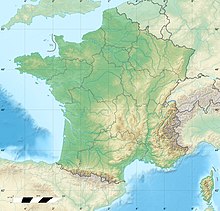
Back Slaget ved Bergerac Danish Bataille de Bergerac French Битва при Бержераке Russian 貝傑拉克戰役 Chinese
| Battle of Bergerac | |||||||
|---|---|---|---|---|---|---|---|
| Part of the Gascon campaign of the Hundred Years' War | |||||||
 18th-century map showing Bergerac within its defences, and the bridge and suburbs south of the Dordogne | |||||||
| |||||||
| Belligerents | |||||||
|
|
| ||||||
| Commanders and leaders | |||||||
|
|
| ||||||
| Strength | |||||||
|
1,200 men-at-arms (of whom 700 were Gascons) 1,500 English longbowmen 2,800 Gascon infantry |
1,600 men-at-arms Large number of infantry | ||||||
| Casualties and losses | |||||||
| Very light |
Over 600 men-at-arms killed; many captured Large number of infantry killed | ||||||
Location within France | |||||||
The Battle of Bergerac was fought between Anglo-Gascon and French forces at the town of Bergerac, Gascony, in August 1345 during the Hundred Years' War. In early 1345 Edward III of England decided to launch a major attack on the French from the north, while sending smaller forces to Brittany and Gascony, the latter being both economically important to the English war effort and the proximate cause of the war. The French focused on the threat to northern France, leaving comparatively small forces in the south-west.
Henry of Grosmont, Earl of Derby arrived in Gascony in August and, breaking with the previous policy of cautious advance, struck directly at the largest French concentration, at Bergerac. He surprised and defeated the French forces under Bertrand I of L'Isle-Jourdain and Henri de Montigny. The French suffered heavy casualties and the loss of the town, a significant strategic setback. Along with the Battle of Auberoche later in the year, it marked a change in the military balance of power in the region. It was the first of a series of victories which would lead to Henry of Derby being called "one of the best warriors in the world" by a contemporary chronicler.[1]
- ^ Rogers 2004, p. 89.
© MMXXIII Rich X Search. We shall prevail. All rights reserved. Rich X Search
